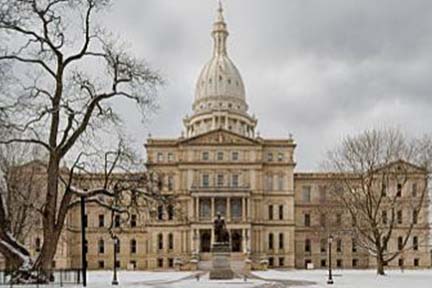
DNR: Arctic grayling reintroduction: May 12 ceremony
 |
|||||
DNR News |
|||||
|

 |
|||||
DNR News |
|||||
|

 |
| For immediate release: January 23, 2025
Media contact: Lynsey Mukomel Program contact: Nate Engle MDARD Launches New Farm-to-Family Grant ProgramProposals due by 5 p.m. on February 21, 2025 LANSING — Michigan’s first-ever grant program aimed at strengthening the state’s middle-of-the-supply-chain agri-food systems is now open, Michigan Department of Agriculture and Rural Development (MDARD) Director Tim Boring announced this week. The new Farm-to-Family “Food Hubs and Farm Stops” grant program is designed to support innovative models that deliver locally produced and healthy food to Michiganders while creating economic opportunities for Michigan farmers. “We’ve heard overwhelming feedback about the need to support food systems during our extensive listening tours across Michigan, and this grant program is one of the first, direct responses we’re taking to meet that need through Farm-to-Family,” said Director Boring. “This grant will support emerging aspects of agriculture and food systems infrastructure as well as the growers and livestock producers who are working so hard to provide for our communities.” Food Hubs and Farm Stops grants will provide up to $50,000 to eligible applicants to support a range of activities including expanding processing capacity, sourcing, transportation infrastructure, distribution service, or other relevant functions that increase the vibrancy of and access to Michigan’s food systems. First proposed by Governor Gretchen Whitmer in her Fiscal Year 2025 Executive Budget Recommendation, Farm-to-Family seeks to further economic prosperity across Michigan, maintain and expand diversity of the state’s agricultural production, and support climate smart and regenerative agriculture value chains. Details on eligibility, funding, how to apply and more are available on MDARD’s website. |

Traffic advisory for I-75 closure in Holly NB/SB I-75 at Evans Road, between Baldwin Road and Grange Hall Rd will be closed for multiple :15 minute intervals this weekend, Jan. 25/26 for aerial installation:
MSP will be assisting with the closure. Plan for delays and/or detour routes. DETOURS:
|


FOR IMMEDIATE RELEASE January 23, 2025 Contact: [email protected]
Governor Whitmer Makes Appointments to Boards and Commissions
LANSING, Mich. — Today, Governor Gretchen Whitmer announced appointments to the following boards and commissions: Michigan Appellate Defender Commission; Mackinac Island State Park Commission; State Board of Ethics, Council on Future Mobility and Electrification; Workers’ Compensation Board of Magistrates; and the Natural Resources Trust Fund.
Michigan Appellate Defender Commission Darryl Woods, of Detroit, is a community support liaison at Growth Works. Additionally, Woods served as chairman of the Detroit Branch NAACP Prison Program Committee for over 15 years. Darryl Woods is reappointed as a member of the general public to represent the interests of individuals who have been impacted by the youth or adult justice system for a term commencing January 23, 2025, and expiring May 24, 2028.
The Michigan Appellate Defender Commission is responsible for the development of a system of indigent appellate defense services which shall include services provided by the office of the state appellate defender and locally appointed private counsel. The Commission will be responsible for the development of minimum standards to which all indigent criminal defense appellate services shall conform and will compile and keep current a statewide roster of attorneys eligible for and willing to accept appointment by an appropriate court to serve as criminal appellate defense counsel for indigents.
This appointment is not subject to the advice and consent of the Senate.
Mackinac Island State Park Commission Lori Frohoff, of Mackinaw City, is the owner of Marshall’s Fudge. Frohoff is the third-generation owner of Marshall’s Fudge – the first fudge shop to move from Mackinac Island to Mackinaw City. Frohoff holds an associate’s degree in paralegal studies and a Bachelor of Business in economics from Ferris State University, as well as a clear credential for K-6 education from Concordia University. Lori Frohoff is appointed as a resident of Mackinaw City for a term commencing January 23, 2025, and expiring April 12, 2030. Frohoff succeeds William Marvin, whose term has expired.
The Mackinac Island State Park Commission was formed in 1895 and is responsible for all aspects of managing Mackinac State Historic Parks. The Commission retains and exercises its authority and responsibility for developing the mission, goals, policies, objectives and direction for the unique properties under its jurisdiction.
This appointment is subject to the advice and consent of the Senate.
State Board of Ethics Carlos Escurel, of West Bloomfield, is an associate principal attorney at Foley, Baron, Metzger & Juip, PLLC. He holds a Bachelor of Arts in international relations from Michigan State University and a Juris Doctorate from Wayne State University School of Law. Carlos Escurel will be reappointed to represent Independents for a term commencing February 8, 2025, and expiring February 7, 2029.
Afia Phillips, of Detroit, is chief information security officer for Little Caesars. Previously, Phillips was global chief information security officer for Mercedes-Benz Mobility AG. Phillips is a certified information systems security professional and holds a Bachelor of Arts in computer science from Wayne State University. Afia Phillips will be reappointed to represent Democrats for a term commencing February 8, 2025, and expiring February 7, 2029.
The State Board of Ethics is authorized to determine the ethical conduct of classified or unclassified state employees, and public officers of the executive branch of Michigan state government who are appointed by the Governor or another executive department official.
These appointments are subject to advice and consent of the Senate.
Michigan Council on Future Mobility and Electrification Judd Herzer, of Holt, is the mobility director for Michigan State University. Previously, Herzer was the director of strategic policy at the Michigan Department of Labor and Economic Opportunity and an infrastructure and technology advisor in the Executive Office of Governor Whitmer. Herzer holds a Bachelor of Arts in political economy and a Juris Doctorate from Western Michigan University. Judd Herzer is appointed to represent business, policy, research, or technological leaders in future mobility for a term commencing January 23, 2025, and expiring October 21, 2025. Herzer succeeds Satish Udpa, who has resigned.
Alan Taub, of West Bloomfield, is the director of the University of Michigan Electric Vehicle Center and a professor of engineering in materials science and mechanical engineering. Prior to joining the University in 2012, Taub retired from General Motors as vice president for global research and development. Taub holds a Bachelor of Science in materials engineering from Brown University and a Master of Science and Doctor of Philosophy in applied physics from Harvard University. Alan Taub is appointed to represent business, policy, research, or technological leaders in future mobility for a term commencing January 23, 2025, and expiring October 21, 2025. Taub succeeds Eric Michielssen, who has resigned.
Beverly Watts, of Detroit, is the president and chief executive officer of BME Consulting and president of the Council of Minority Transportation Officials of Michigan. Watts was previously the director of the Department of Public Services for Wayne County and a member of the Michigan Infrastructure Council. Watts holds a Bachelor of Arts in telecommunications from Michigan State University and an executive leadership certification from the Harvard Kennedy School. Beverly Watts is appointed to represent business, policy, research, or technological leaders in future mobility for a term commencing January 23, 2025, and expiring October 21, 2027. Beverly Watts succeeds Patrick Cadariu, whose term has expired.
Emily Frascaroli, of Grosse Ile, is global director of the Automotive Safety Office at Ford Motor Company, a lecturer at the University of Michigan Law School, and co-chair of the legal and insurance workgroup for MCity at the University of Michigan. Previously, Frascaroli was managing counsel of the product litigation group at Ford. Frascaroli holds a Bachelor of Science in aerospace engineering from the University of Southern California, a Master of Engineering in aerospace engineering from the University of Michigan, and a Juris Doctorate from Wayne State University Law School. Emily Frascaroli is reappointed to represent insurance interests for a term commencing January 23, 2025, and expiring October 21, 2028.
Matthew Rudnick, of Birmingham, is the director of climate, environment, and energy policy for General Motors, where he has worked since 2003. Rudnick earned a Bachelor of Science and Master of Science Engineering in industrial engineering from the University of Michigan. Matthew Rudnick is reappointed to represent business, policy, research, or technological leaders in future mobility for a term commencing January 23, 2025, and expiring October 21, 2028.
The Michigan Council on Future Mobility and Electrification serves in an advisory capacity to the Department of Labor and Economic Opportunity and the Office of Future Mobility and Electrification, the Governor, and the Legislature, providing annual recommendations on changes in state policy. In doing so, the Council works to ensure Michigan continues to be an epicenter of future transportation solutions around mobility and electrification.
These appointments are not subject to the advice and consent of the Senate.
Workers’ Compensation Board of Magistrates Jane Hofmeyer, of Grand Rapids, is an attorney at Kluczynski, Girtz & Vogelzang, representing employers, insurers, and third-party claims administrators in the area of workers’ compensation. Hofmeyer serves on the Board of Directors of the Community Media Center and is a past president of the Grand Rapids Bar Association’s Workers’ Compensation section and Big Brothers/Big Sisters of Greater Lansing. Hofmeyer holds a Bachelor of Arts in history from The College of Wooster and a Juris Doctorate from Cooley Law School. Jane Hofmeyer will be appointed to the Workers’ Compensation Board of Magistrates for a term commencing January 27, 2025, and expiring January 26, 2029. Hofmeyer succeeds Richard Ehrlich, who passed away following his recent reappointment.
The Workers’ Compensation Board of Magistrates has been established as an autonomous entity within the Workers’ Disability Compensation Agency per Executive Order No. 2019-13. Only workers’ compensation magistrates can hear cases for which an application for hearing has been filed with the Workers’ Disability Compensation Agency. The Board of Magistrates currently consists of 14 members appointed by the Governor. All members of the board shall be members in good standing of the State Bar of Michigan and have been an attorney licensed to practice in the courts of this state for 5 years or more.
This appointment is subject to the advice and consent of the Senate.
Natural Resources Trust Fund William “Bill” Rustem, of Mason, is the former president and chief executive officer of Public Sector Consultants. Rustem previously served as Governor William Milliken’s chief staff advisor on environmental matters and as director of the Governor’s Policy Council. In addition, Rustem served as the director of strategy for the Office of Strategic Policy under Governor Rick Snyder. Rustem earned a Bachelor of Science in social sciences and a Master of Science in resource development from Michigan State University. William Rustem is reappointed to the Natural Resources Trust Fund for a term commencing January 23, 2025, and expiring October 1, 2028.
The Michigan Natural Resources Trust Fund Board oversees the Michigan Natural Resource Trust Fund (MNRTF) which has been in place since 1976. The Trust Fund provides financial assistance to local governments and the Department of Natural Resources to purchase land or rights in land for public recreation or protection of land because of its environmental importance or its scenic beauty. It also assists in the appropriate development of land for public outdoor recreation.
This appointment is subject to the advice and consent of the Senate. |

|
|
|
|
|